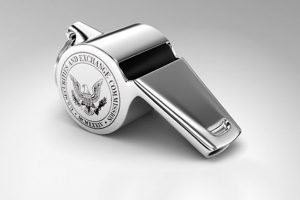
The 2018 fiscal year was an active one for the Securities and Exchange Commission’s Whistleblower program. In fact, the agency received more tips and paid out more in rewards than in any year since the SEC Whistleblower Office opened its doors in 2011.
In its 2018 annual report to Congress, issued last week, the agency disclosed that it had awarded $168 million to 13 individuals during the latest fiscal year, which ended on September 30. That figure tops the combined total amount awarded in the six years since the program began. The SEC has now awarded $326 million to 59 individuals since its beginning.
The Office of the Whistleblower also reported that it had received 5,282 whistleblower tips during the year—the most in a single year and about 18 percent more than in 2017. Tips came from individuals in 72 foreign countries and the United States.
Under the Whistleblower rules, individuals who provide information that leads to successful SEC actions resulting in sanctions over $1 million may be eligible to receive a monetary award of up to 10 percent to 30 percent of the fines collected. Internal auditors are eligible to collect awards, however there are a series of additional rules that must be met, including first reporting the wrongdoing internally.
A Growing Success
“The whistleblower program continued to grow and make substantial contributions to the Commission’s enforcement and investor protection efforts,” said Jane Norberg, head of the SEC’s Office of the Whistleblower, in the report to Congress. “While the dollars awarded and volume of tips received are reflections of the program’s success, we are most proud of the program’s added value in the protection of the Main Street investor.”
Since the program’s inception, the SEC has ordered defendants in enforcement cases that were brought with information from whistleblowers to pay over $1.7 billion in total sanctions, including more than $901 million in disgorgement of ill-gotten gains and interest, of which approximately $452 million has been returned to harmed investors, the SEC noted.
“The ongoing success of the SEC Whistleblower Program demonstrates once again that providing incentives to whistleblowers to come forward with information is a highly effective way to combat fraud and protect the reliability of our financial markets,” says Brian McCafferty, managing partner at law firm Kenney & McCafferty, which specializes in whistleblower law. “These whistleblower tips may have prevented the next Madoff or Enron disaster for American investors.”
Increasing Number of Tips
Since the Whistleblower Office was established in 2011, it has received an increasing number of whistleblowers tips in each consecutive year.
Fiscal Year Number of tips received
2011 334
2012 3,001
2013 3,238
2014 3,620
2015 3,923
2016 4,218
2017 4,484
2018 5,282
Source: SEC
“The main goal of the whistleblower program is to incentivize the reporting of specific, timely, and credible information to the Commission. Therefore, one of the top priorities of the Office of the Whistleblower has been, and will continue to be, processing meritorious award claims,” said he SEC’s Norberg in the report.
In addition, the SEC made two of its largest-ever whistleblower awards this past fiscal year—a total combined $83 million award shared by three individuals, and an award of almost $54 million shared by two individuals. The recipients of these large awards provided significant information regarding serious violations that otherwise might have gone unnoticed and resulted in substantial enforcement actions, the SEC said.
Limits on Awards?
Another major development in the SEC whistleblower program is a plan, released in June, to put caps on the largest awards paid out by the agency. The proposed rule change which would give the agency discretion to limit awards that are based on penalties of $100 million or more, but set a floor for those large awards of $30 million. That change could effectively allow the SEC to set a $30 million cap on awards in many circumstances.
“The proposed rules are intended to help strengthen the whistleblower program by bolstering the Commission’s ability to more appropriately and expeditiously reward those who provide critical information that leads to successful enforcement actions,” said SEC Chairman Jay Clayton in a press release announcing the proposal.
The funding for whistleblower awards comes from a special account at the Treasury department funded by the penalties the SEC collects from defendants. So far, however, only a small fraction of the fund has been paid out to whistleblowers.
Some are concerned that limits to whistleblower awards could dampen the appeal to potential whistleblowers to come forward. “I strongly disagree with the proposed discretionary cap on awards exceeding $100 million,” wrote Madoff whistleblower Harry Markopolos in a comment letter to the SEC. “Although well intentioned, this provision would be a gift to the major investment banks and other large public companies, as it would deter high-ranking officers at those entities from turning whistleblower.” In fact, the SEC received more than 3,500 comments opposed to the proposal to limit awards.
According the SEC whistleblower report to Congress, about 69 percent of award recipients have been current or former employees of the businesses that were being reported upon. Among these insiders, roughly 83 percent of them had raised their concerns internally before reporting to the SEC.
The comment period on the SEC proposal to limit awards ended in late October. The SEC is expected to take a final vote on the proposal early next year. ![]()
Joseph McCafferty is Editor & Publisher of Internal Audit 360°
RELATED ARTICLE:



One Reply to “SEC Whistleblower Program Set Records in 2018”